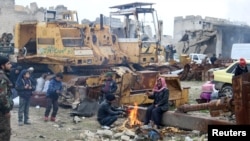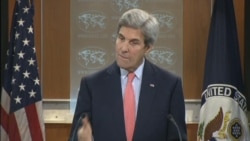An agreement was reached Saturday to resume the evacuation of Syria's eastern Aleppo, though hours later, the evacuation hasn't started and rebels and civilians are still waiting.
The evacuation was suspended Friday due to demands from pro-government forces who wanted two villages — Foua and Kfarya — evacuated. Residents of the villages will be included in Saturday's exodus, which has yet to begin.
The Britain-based Syrian Observatory for Human Rights said it expected 4,000 people to be evacuated from the two villages starting on Saturday and reported that 29 buses were en route to the villages to start the evacuation process.
The Syrian government suspended the evacuation Friday after blasts and gunfire were heard in Aleppo. Both rebels and government forces accused the other of breaking the fragile cease-fire agreement.
U.N. refugee agency commissioner Filippo Grandi warned Saturday that the violence in Aleppo could spread to other areas if the war in Syria isn’t immediately brought to a halt.
"There is grave risk now that such displacement and suffering will not stop, but will be repeated elsewhere, in other wars. For the sake of civilian protection everywhere, Syria's conflict must be ended, now, and without delay," he said in a statement. "Civilians should not be hostage to negotiations."
Russian news agencies reported Saturday that the Russian Foreign Ministry hopes the evacuation of rebel fighters in eastern Aleppo will lead to new cease-fire possibilities in other areas of Syria.
The Syrian government had ordered trucks and buses carrying people out of the rebel-held parts of Aleppo to turn around as the army set up roadblocks along the highway that had been used in the evacuation.
Turkey, which has been heavily involved in the Aleppo peace process, said the suspensions were temporary.
Syria's government said the rebels broke the agreement by trying to smuggle heavy weapons and hostages out of Aleppo. The rebels, though, accused the government of suspending the evacuation as a way to pressure them into releasing civilians from Foua and Kfarya - two government-held Shi'ite villages currently under siege by the rebels.
The government said the evacuations in the villages had to coincide with those in eastern Aleppo, but the rebels had said the two are unrelated.
One of the rebel leaders who leads the al Sham group, blamed Iran for holding up the deal for political reasons and said Russia wasn't doing enough to restrain its ally.
"Iran and its sectarian proxies are using the humanitarian situation of our people in besieged Aleppo and preventing civilians from leaving until the evacuation of their groups in Foua and Kfarya," Munir al-Sayal told Reuters.
Talks planned
On Friday, Russian President Vladimir Putin said his country is working with Turkey to start a new round of peace talks on Syria with a goal of a nationwide cease-fire.
The U.N. Security Council met in a closed-door emergency session Friday to discuss Aleppo and more talks are planned Saturday.
France, which called for the meeting, wants international observers on hand to monitor the evacuation of civilians. Previous cease-fires collapsed almost immediately, putting a halt to evacuation efforts.
The conflict in Syria, which began nearly six years ago as a protest against the government, has so far killed more than 310,000 people and forced millions of people to flee their homes.
Watch: John Kerry: Key partners do their part in Syria
In Washington, U.S. Secretary of State John Kerry said, "We have witnessed indiscriminate slaughter, not accidents of war, not collateral damage, but frankly purposeful, cynical policy of terrorizing civilians."
Kerry said the United States is going to work to save lives and continue pushing all parties in Syria toward a resolution and allow full access by humanitarian groups throughout all of Syria.
U.S. President Barack Obama has denounced the "horror" in Aleppo and warned Syrian President Bashar al-Assad he cannot "slaughter his way to legitimacy."








